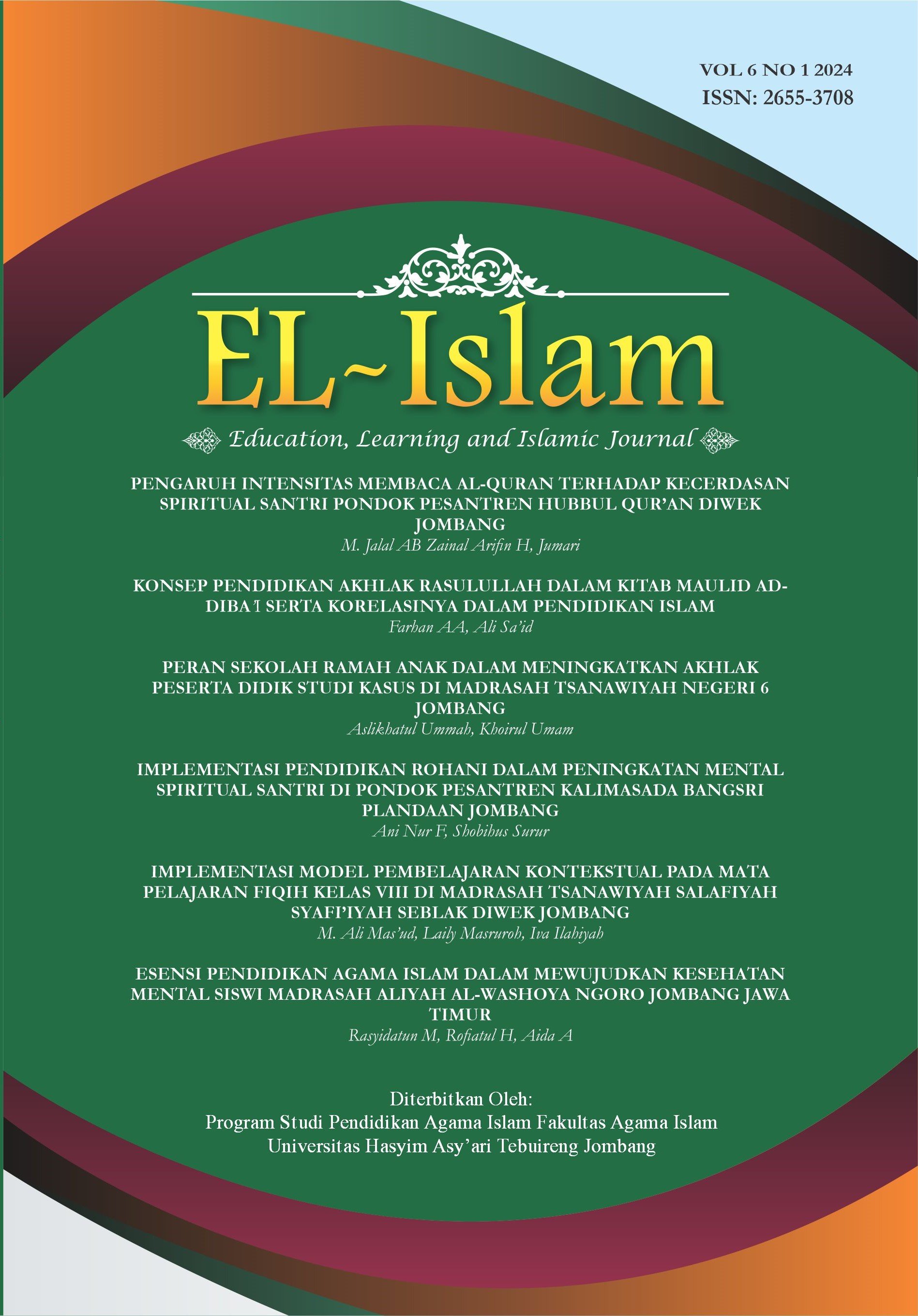KONSEP PENDIDIKAN AKHLAK RASULULLAH DALAM KITAB MAULID AD-DIBA’I SERTA KORELASINYA DALAM PENDIDIKAN ISLAM
DOI:
https://doi.org/10.33752/el-islam.v6i1.6071Keywords:
Education, Attitude, Islamic Education, Abdurrahman Ad-Diba'iAbstract
The background study of this research that attitude is essential to human life and a necessity emphasized in islamic religion. Good attitude is a duty for muslims to act and behave accordingly, for it is in accordance with thedesign and design of human creation.The purpose of this study is to describe the moral education concepts contained in the book maulid ad-diba 'i and its correlation to islamic education. The study is a type of research library research and theapproach used is a qualitative approach. As for the step in this study, it is to search out and find data by reading, reviewing, studying literature that deals with the issues that will be discussed, then data collected, and properly analyzed according to the established rules. The techniques used are documentaries that collect data that is the subject of research from existing documents of books, articles, journals, and so on. Researchers use a method in analyzing the problem is a descriptive analysis method, which collects data in th form of words not in numbers, this is due to the application of qualitative methods.The results of this study indicate that the concept of themoral education of the Prophet in the Book of Maulid Diba' includes: repentance, gratitude, always remembering Allah, honest, patient, humble, true, compassionate, and forgiving. Theimportance of moral education methods in Islamic education is none other than to achieve the goals of Islamic education, because the moral values in the book are prophetic morals which will be exemplary for become someone who is always in goodness by getting used to good behavior guided by the Al-Qur'an 'an. Based on this research, it can be cancluded that there are moral values that guide us in human relationship with Allah SWT and also morals towards fellow human beings. As for some of these matters, namely: 1) repentance, 2) gratitude, 3) always remember Allah, 4) honest, 5) patient, 6) humble, 7) true of always honest, 8) affection, and 9) forgive.
Downloads
References
Al-Qur’an dan terjemahannya, (Semarang: Menara Kudus, 1990).
Ad-Diba’i, Imam Abdurrahman, Maulid ad-Diba’i, Terj. Baidlowi Syamsyuri, (Surabaya: Apollo Lestari).
Ahmad Syar’i, Filsafat Pendidikan Islam, 192.
Anwar, Rosihon, Akidah Akhlak, (Bandung: Pustaka Setia, 2008.
Daradjat, Zakiah, Ilmu Pendidikan Islam, Jakarta: Bumi Aksara,2014.
H.R Muslim (hadis no. 3297), 40 Hadis Keutamaan Dzikir & Berdzikir, terj. Habib Abdurrahman Ali Al-Habsy dan Ahmad Lutfi Fathullah Mughni (Jakarta: Majelis Dzikir SBY Nurussalam, 2008).
Ibrahim, Syeikh Abdul Aziz Bin Muhammad Bin, Kitabus Sittah: Shohih Bukhori, Cet. Ke 4.
Jalal, Abdul Fattah, Minal Ushulit Tarbawiyyah Fil Islam, Terj. Hery Noer Ali, Azas-Azas Pendidikan Islam, (Bandung: Diponegoro, 1988).
Masy’ari, Anwar, Akhlak Al-Qur’an, (Surabaya: PT. Bina Ilmu 1990).
Minarti, Sri, Ilmu Pendidikan Islam: Fakta Teoritis-Filosofis & Aplikatif Normatif, (Jakarta: Amzah. 2013).
Mujahidin, Adnan Mahdi, Panduan Penelitian Praktis Untuk Menyusun Skripsi, Tesis, & Disertasi, Bandung: Alfabeta, 2014.
Nawawi, Imam, Hadist Arba’in Nawawi, terj. Tim Pustaka Nuun, (Semarang : Pustaka Nuun, 2012)
Salim, Habib Umar bin, Is'af Talibi Rida al-Khalaq, terj. Wahid Ahtar Baihaqi, Aku Diutus Untuk Menyempurnakan Akhlak, ( Tangerang Selatan: Putera Bumi, 2019).
Sugiyono, Cara Mudah Menyusun Skripsi, Tesis Dan Disertasi, Bandung: Alfabeta, 2016.
Suharsaputra, Uhar, Metode Penelitian Kuantitatif, Kualitatif, dan Tindakan, Bandung: PT. Refika Aditama, 2012.
Syar’i, Ahmad, Filsafat Pendidikan Islam, Kalimantan Tengah: CV. Narasi Nara, 2020.
Zed, Mestika, Metodologi Penelitian Kepustakaan, Jakarta: Yayasan Obor Indonesia, 2014.
















